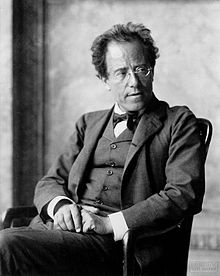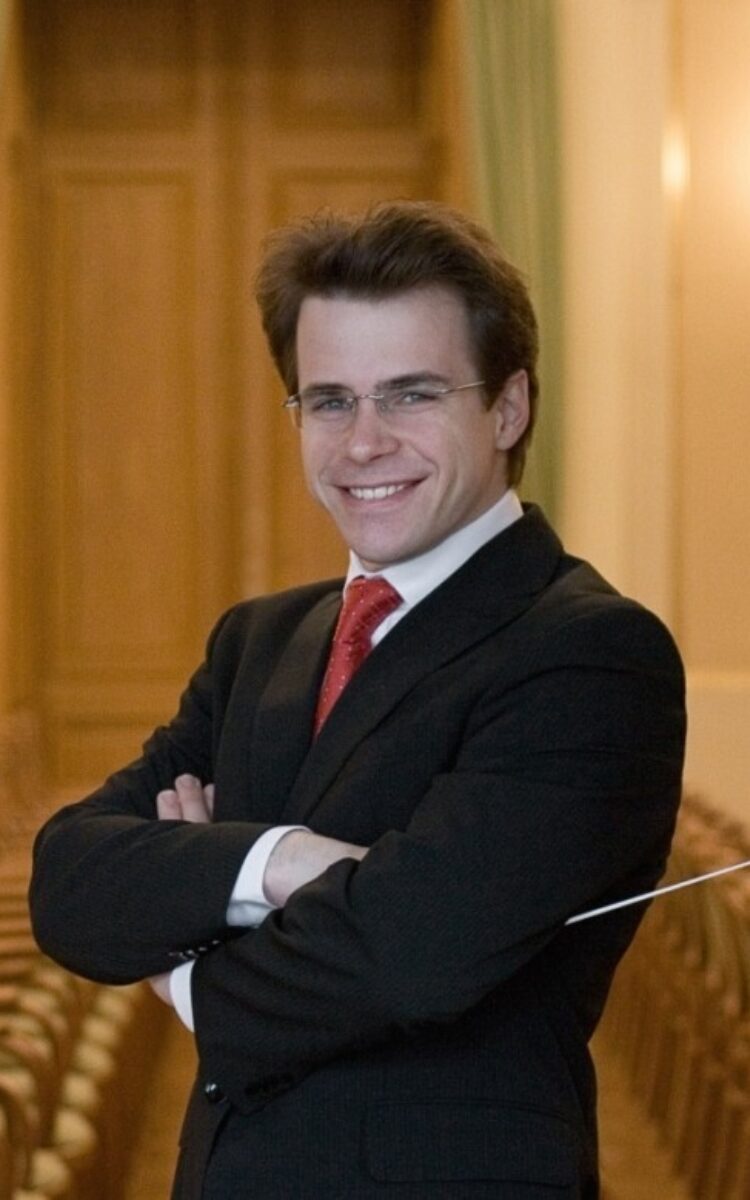This Week in Classical Music: June 12, 2023.Maher’s 9th at the CSO.Jakub Hrůša, a Czech conductor, came to Chicago to perform one work, Mahler’s Ninth, his last completed symphony.Any performance of this work by the Chicago Symphony Orchestra is an event, and so was the concert this past Thursday.The CSO doesn’t play the Ninth often: the last performance at the Symphony Center was five years ago, under the direction of Esa-Pekka Salonen, a wonderful Finnish conductor and the current San Francisco Symphony music director.But we vividly remember it being played in December of 1995 when Pierre Boulez led the orchestra in a profound reading.Boulez and the CSO then recorded it at Medinah Temple and received a Grammy for it.Those were the times when Grammys were worth something.By the way, Riccardo Muti, the outgoing Music Director, has never conducted this symphony, or, as far as we know, any other of Mahler’s, except for his youthful no. 1.
Jakub Hrůša is 41 years old and somewhat of a late-rising star.After conducting several orchestras in his native Czech Republic for several years, in 2016 he was made the chief conductor of the Bamberg Symphony, one of Germany’s better orchestras.The following year he was appointed as one of two principal guest conductors of the Philharmonia Orchestra, London.In 2021 he was made the principal guest conductor of the Orchestra of the Accademia di Santa Cecilia in Rome.Hrůša’s big break came in 2022, when he was appointed the music director designate of the Royal Opera House (the Covent Garden), with the formal appointment as Music Director coming in 2025.
But what about the performance in Chicago?We want to preface our brief assessment with this: we think that no performance by a major orchestra can be bad these days (this was not the case 40 years ago).What we mean is that Mahler’s music contains so much material, both at any given moment and in temporal relation to each other, that even if certain episodes are not done very well, there’s still an enormous amount of substance to overwhelm the listener.For example, under Hrůša’s baton, the opening bars and the first “breathing theme” of the first movement (Andante Comodo) sounded a bit disjointed – maybe nerves and the fact that it was the first of three performances, but it didn’t matter much as things settled down quickly and proceeded wonderfully.The second movement, a series of rustic dances, and the third, Rondo-Burleske, were nervy, sardonic, and at times violent, altogether very well played.We have some qualms with the magnificent final Adagio marked Sehr langsam und noch zurückhaltend (very slowly and reserved).Everything was in place, but somehow not revelatory.This was good, but “good” is not exactly what one expects from this music: Boulez’s finale broke one’s heart.Maybe it’s his younger age and Hrůša will eventually go deeper.The public rewarded the conductor and the musicians with prolonged and enthusiastic applause.The gracious Hrůša went around the orchestra, thanking all the principal players, and then patted the score, indicating the most important element of the proceedings.We thought that to be a very proper gesture: even though the orchestra’s playing was excellent and Hrůša’s interpretation fine, it was Mahler’s genius that made the evening so memorable.
A couple of extraneous points.The Orchestra Hall was full, which is great, considering that Hrůša isn’t that well known in Chicago.As expected, no reviews were published in the major newspapers.Larry Johnson published a nice one in his Chicago Classical Review.And, despite some quibbles, we would be happy if Jakub Hrůša became Muti’s successor.
Maher’s 9th at the CSO, 2023
This Week in Classical Music: June 12, 2023. Maher’s 9th at the CSO. Jakub Hrůša, a Czech conductor, came to Chicago to perform one work, Mahler’s Ninth, his last completed symphony. Any performance of this work by the Chicago Symphony Orchestra is an event, and so was the concert this past Thursday. The CSO doesn’t play the Ninth often: the last performance at the Symphony Center was five years ago, under the direction of Esa-Pekka Salonen, a wonderful Finnish conductor and the current San Francisco Symphony music director. But we vividly remember it being played in December of 1995 when Pierre Boulez led the orchestra in a profound reading. Boulez and the CSO then recorded it at Medinah Temple and received a Grammy for it. Those were the times when Grammys were worth something. By the way, Riccardo Muti, the outgoing Music Director, has never conducted this symphony, or, as far as we know, any other of Mahler’s, except for his youthful no. 1.
Any performance of this work by the Chicago Symphony Orchestra is an event, and so was the concert this past Thursday. The CSO doesn’t play the Ninth often: the last performance at the Symphony Center was five years ago, under the direction of Esa-Pekka Salonen, a wonderful Finnish conductor and the current San Francisco Symphony music director. But we vividly remember it being played in December of 1995 when Pierre Boulez led the orchestra in a profound reading. Boulez and the CSO then recorded it at Medinah Temple and received a Grammy for it. Those were the times when Grammys were worth something. By the way, Riccardo Muti, the outgoing Music Director, has never conducted this symphony, or, as far as we know, any other of Mahler’s, except for his youthful no. 1.
Jakub Hrůša is 41 years old and somewhat of a late-rising star. After conducting several orchestras in his native Czech Republic for several years, in 2016 he was made the chief conductor of the Bamberg Symphony, one of Germany’s better orchestras. The following year he was appointed as one of two principal guest conductors of the Philharmonia Orchestra, London. In 2021 he was made the principal guest conductor of the Orchestra of the Accademia di Santa Cecilia in Rome. Hrůša’s big break came in 2022, when he was appointed the music director designate of the Royal Opera House (the Covent Garden), with the formal appointment as Music Director coming in 2025.
orchestras in his native Czech Republic for several years, in 2016 he was made the chief conductor of the Bamberg Symphony, one of Germany’s better orchestras. The following year he was appointed as one of two principal guest conductors of the Philharmonia Orchestra, London. In 2021 he was made the principal guest conductor of the Orchestra of the Accademia di Santa Cecilia in Rome. Hrůša’s big break came in 2022, when he was appointed the music director designate of the Royal Opera House (the Covent Garden), with the formal appointment as Music Director coming in 2025.
But what about the performance in Chicago? We want to preface our brief assessment with this: we think that no performance by a major orchestra can be bad these days (this was not the case 40 years ago). What we mean is that Mahler’s music contains so much material, both at any given moment and in temporal relation to each other, that even if certain episodes are not done very well, there’s still an enormous amount of substance to overwhelm the listener. For example, under Hrůša’s baton, the opening bars and the first “breathing theme” of the first movement (Andante Comodo) sounded a bit disjointed – maybe nerves and the fact that it was the first of three performances, but it didn’t matter much as things settled down quickly and proceeded wonderfully. The second movement, a series of rustic dances, and the third, Rondo-Burleske, were nervy, sardonic, and at times violent, altogether very well played. We have some qualms with the magnificent final Adagio marked Sehr langsam und noch zurückhaltend (very slowly and reserved). Everything was in place, but somehow not revelatory. This was good, but “good” is not exactly what one expects from this music: Boulez’s finale broke one’s heart. Maybe it’s his younger age and Hrůša will eventually go deeper. The public rewarded the conductor and the musicians with prolonged and enthusiastic applause. The gracious Hrůša went around the orchestra, thanking all the principal players, and then patted the score, indicating the most important element of the proceedings. We thought that to be a very proper gesture: even though the orchestra’s playing was excellent and Hrůša’s interpretation fine, it was Mahler’s genius that made the evening so memorable.
A couple of extraneous points. The Orchestra Hall was full, which is great, considering that Hrůša isn’t that well known in Chicago. As expected, no reviews were published in the major newspapers. Larry Johnson published a nice one in his Chicago Classical Review. And, despite some quibbles, we would be happy if Jakub Hrůša became Muti’s successor.